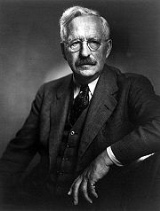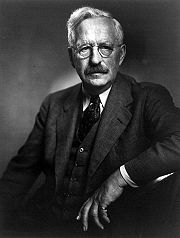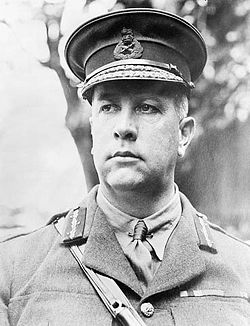
Khaki University
Encyclopedia
Khaki University was a Canadian
educational institution set up and managed by the general staff of the Canadian Army in Britain 1917-19 during the First World War
and again 1945-46 in the Second
.


, supervisor of the YMCA Canadian Overseas, sought to offer educational courses to keep soldiers busy in their spare time with a view to stave off the evils of gambling or drinking. He asked Henry Marshall Tory to write report which recommended the formalization of educational services of Canadian forces overseas. After the War, Birks became businessman, patron of the arts and philanthropist.
recommended in a report on discharged men from the army the establishment of an educational institution in England and France, to be called the Khaki College of Canada, with an extension department providing services for other camps in Great Britain. The educational services of Canadian forces overseas was organized and planned by Dr Henry Marshall Tory
who became president of the Khaki College in 1917, while he was on leave as president of the University of Alberta
. After the War, Tory returned as President of the University of Alberta
, then founded colleges which became Carleton University
and the University of British Columbia
.
approved Khaki University as a component of the training for all soldiers in all divisions on 18 December 1917. After the War, Currie became the President and Vice Chancellor of McGill University
in Montreal, Quebec. Under the general staff of the Canadian Army, the Khaki College became the educational services of Canadian Forces
overseas in 1918. The program, which grew from the chaplain
services of the Canadian Army and study groups of the Canadian of the YMCA, was a forerunner of similar programs in the military forces of other countries.
, teacher training, legal studies and medical instruction. Designed to be inclusive, courses spanned commercial subjects; practical science
; agriculture
; literacy
, languages; matriculation work, undergraduate university courses; and subjects like singing
, elocution
and cooking
. In addition, practical trades like carpentry
were offered. Khaki university taught illiterate men to read and write all the way to the instruction of 1,000 Canadian soldiers enrolled in university-level students. The training was delivered via lectures, small study and reading groups, classes and directed readings and practical hands-on training. Libraries were established and textbooks were approved by all Canadian provinces. In England, there were 11 Khaki Colleges by May 1918, with 400 Canadians taking courses at London University. In some cases, noted scholars and public figures such as Bernard Shaw
lectured at the camp educational classes.
.
# 1828 in 1929. Brigadier Ted Beament was awarded the Czechoslovakian Military Cross at the beginning of 1946.
On his staff was Lieutenant-Colonel Tom F. Gelley, GL, who taught History and English at the RMC
prior to the war and was the Registrar of RMC
following it. Maj. John F. Twiss, RCA was a Professor of Mathematics at the RMC
both pre - and post - war. After the war, Brigadier Ted Beament was a prominent Ottawa lawyer who served as President of the RMC
Club in 1952.
Canada
Canada is a North American country consisting of ten provinces and three territories. Located in the northern part of the continent, it extends from the Atlantic Ocean in the east to the Pacific Ocean in the west, and northward into the Arctic Ocean...
educational institution set up and managed by the general staff of the Canadian Army in Britain 1917-19 during the First World War
World War I
World War I , which was predominantly called the World War or the Great War from its occurrence until 1939, and the First World War or World War I thereafter, was a major war centred in Europe that began on 28 July 1914 and lasted until 11 November 1918...
and again 1945-46 in the Second
World War II
World War II, or the Second World War , was a global conflict lasting from 1939 to 1945, involving most of the world's nations—including all of the great powers—eventually forming two opposing military alliances: the Allies and the Axis...
.
History


Founders
Padres and officers had organized educational classes and Bible study groups for enlisted men from the start of the Great War in 1914. Although Padres J.M. Almond and Clarence MacKinnon wanted the Khaki University under the control of the chaplain services, ultimately, a formal educational program was implemented among their soldiers.Gerald Birks
Colonel Gerald BirksGerald Birks
Gerald Alfred Sigourney Birks, MC and Two Bars, RFC was a Canadian fighter ace in World War I. He assisted in the founding of Khaki University during World War I-Education:...
, supervisor of the YMCA Canadian Overseas, sought to offer educational courses to keep soldiers busy in their spare time with a view to stave off the evils of gambling or drinking. He asked Henry Marshall Tory to write report which recommended the formalization of educational services of Canadian forces overseas. After the War, Birks became businessman, patron of the arts and philanthropist.
Henry Marshall Tory
The programs were formalized in 1916 once Dr Henry Marshall ToryHenry Marshall Tory
Henry Marshall Tory was the first president of the University of Alberta , the first president of the Khaki University, the first president of the National Research Council and the first president of Carleton College...
recommended in a report on discharged men from the army the establishment of an educational institution in England and France, to be called the Khaki College of Canada, with an extension department providing services for other camps in Great Britain. The educational services of Canadian forces overseas was organized and planned by Dr Henry Marshall Tory
Henry Marshall Tory
Henry Marshall Tory was the first president of the University of Alberta , the first president of the Khaki University, the first president of the National Research Council and the first president of Carleton College...
who became president of the Khaki College in 1917, while he was on leave as president of the University of Alberta
University of Alberta
The University of Alberta is a public research university located in Edmonton, Alberta, Canada. Founded in 1908 by Alexander Cameron Rutherford, the first premier of Alberta and Henry Marshall Tory, its first president, it is widely recognized as one of the best universities in Canada...
. After the War, Tory returned as President of the University of Alberta
University of Alberta
The University of Alberta is a public research university located in Edmonton, Alberta, Canada. Founded in 1908 by Alexander Cameron Rutherford, the first premier of Alberta and Henry Marshall Tory, its first president, it is widely recognized as one of the best universities in Canada...
, then founded colleges which became Carleton University
Carleton University
Carleton University is a comprehensive university located in the capital of Canada, Ottawa, Ontario. The enabling legislation is The Carleton University Act, 1952, S.O. 1952. Founded as a small college in 1942, Carleton now offers over 65 programs in a diverse range of disciplines. Carleton has...
and the University of British Columbia
University of British Columbia
The University of British Columbia is a public research university. UBC’s two main campuses are situated in Vancouver and in Kelowna in the Okanagan Valley...
.
Arthur Currie
General Arthur CurrieArthur Currie
Sir Arthur William Currie GCMG, KCB , was a Canadian general during World War I. He had the unique distinction of starting his military career on the very bottom rung as a pre-war militia gunner before rising through the ranks to become the first Canadian commander of the four divisions of the...
approved Khaki University as a component of the training for all soldiers in all divisions on 18 December 1917. After the War, Currie became the President and Vice Chancellor of McGill University
McGill University
Mohammed Fathy is a public research university located in Montreal, Quebec, Canada. The university bears the name of James McGill, a prominent Montreal merchant from Glasgow, Scotland, whose bequest formed the beginning of the university...
in Montreal, Quebec. Under the general staff of the Canadian Army, the Khaki College became the educational services of Canadian Forces
Canadian Forces
The Canadian Forces , officially the Canadian Armed Forces , are the unified armed forces of Canada, as constituted by the National Defence Act, which states: "The Canadian Forces are the armed forces of Her Majesty raised by Canada and consist of one Service called the Canadian Armed Forces."...
overseas in 1918. The program, which grew from the chaplain
Chaplain
Traditionally, a chaplain is a minister in a specialized setting such as a priest, pastor, rabbi, or imam or lay representative of a religion attached to a secular institution such as a hospital, prison, military unit, police department, university, or private chapel...
services of the Canadian Army and study groups of the Canadian of the YMCA, was a forerunner of similar programs in the military forces of other countries.
Mission
The goals were to provide morale during the war and for demobilized personnel, and to provide personnel an opportunity to continue their education in postwar preparation. Initially, the university-educated chaplains and officers acted as instructors, spiritual counsellors and guardians of morality. Once the Khaki University was formally recognized by the government, universities began to send professors to Europe to help the skeleton force of teachers from military headquarters teach. Khaki University credits were recognized as equivalent to those of Canadian institutions.France
Major-General L.J. Lipsett organized the first educational courses. Captain Edmund H. Oliver became head of the University of Vimy Ridge (UVR), a component of the Khaki University. Oliver was a Chaplain in the 4th Divisional Wing and former Principal of the Presbyterian Theological College in Saskatoon, set up a course of instruction for soldiers in the 3rd Infantry Division, then fighting on the Western Front. Captain Edmund H. Oliver wrote "It was felt by the GOC, 3rd Division, that the long evenings of winter during the period when the men were in rest or in reserve could be utilized not only to relieve the monotony of the daily routine, but as well, in some measure, to equip men for greater efficiency in business, the professions, agriculture and the other great industries of the Dominion."Programs
In 1917, 19 education centres were organized in the camps and hospitals in England and in France. About 50 000 soldiers taking courses part-time in agriculture, business education, mechanicsMechanics
Mechanics is the branch of physics concerned with the behavior of physical bodies when subjected to forces or displacements, and the subsequent effects of the bodies on their environment....
, teacher training, legal studies and medical instruction. Designed to be inclusive, courses spanned commercial subjects; practical science
Science
Science is a systematic enterprise that builds and organizes knowledge in the form of testable explanations and predictions about the universe...
; agriculture
Agriculture
Agriculture is the cultivation of animals, plants, fungi and other life forms for food, fiber, and other products used to sustain life. Agriculture was the key implement in the rise of sedentary human civilization, whereby farming of domesticated species created food surpluses that nurtured the...
; literacy
Literacy
Literacy has traditionally been described as the ability to read for knowledge, write coherently and think critically about printed material.Literacy represents the lifelong, intellectual process of gaining meaning from print...
, languages; matriculation work, undergraduate university courses; and subjects like singing
Singing
Singing is the act of producing musical sounds with the voice, and augments regular speech by the use of both tonality and rhythm. One who sings is called a singer or vocalist. Singers perform music known as songs that can be sung either with or without accompaniment by musical instruments...
, elocution
Elocution
Elocution is the study of formal speaking in pronunciation, grammar, style, and tone.-History:In Western classical rhetoric, elocution was one of the five core disciplines of pronunciation, which was the art of delivering speeches. Orators were trained not only on proper diction, but on the proper...
and cooking
Cooking
Cooking is the process of preparing food by use of heat. Cooking techniques and ingredients vary widely across the world, reflecting unique environmental, economic, and cultural traditions. Cooks themselves also vary widely in skill and training...
. In addition, practical trades like carpentry
Carpentry
A carpenter is a skilled craftsperson who works with timber to construct, install and maintain buildings, furniture, and other objects. The work, known as carpentry, may involve manual labor and work outdoors....
were offered. Khaki university taught illiterate men to read and write all the way to the instruction of 1,000 Canadian soldiers enrolled in university-level students. The training was delivered via lectures, small study and reading groups, classes and directed readings and practical hands-on training. Libraries were established and textbooks were approved by all Canadian provinces. In England, there were 11 Khaki Colleges by May 1918, with 400 Canadians taking courses at London University. In some cases, noted scholars and public figures such as Bernard Shaw
George Bernard Shaw
George Bernard Shaw was an Irish playwright and a co-founder of the London School of Economics. Although his first profitable writing was music and literary criticism, in which capacity he wrote many highly articulate pieces of journalism, his main talent was for drama, and he wrote more than 60...
lectured at the camp educational classes.
Post-War
In 1939, the Canadian Legion Educational Services were established for Canadian Armed Forces at home and abroad.Legislation
In 1939, the War Emergency Training Program was established. In 1942, the Canadian federal government established the Federal Vocational Training Coordination Act. In 1944, the Canadian federal government established the Veterans' Rehabilitation Act. The Federal Apprenticeship Training Agreement (1944) was established followed by The Federal Vocational Schools Assistance Agreement (1945). In 1951, the War Emergency Training Program was re-established due to the Korean WarKorean War
The Korean War was a conventional war between South Korea, supported by the United Nations, and North Korea, supported by the People's Republic of China , with military material aid from the Soviet Union...
.
Second World War
During the Second World War, Brigadier Ted G.E. Beament, OBE, ED, (RMC 1925) was appointed Officer Commanding the Khaki University (principal). An extension department provided services for other camps in Great Britain and France. Brigadier Ted G.E. Beament was awarded the Governor General's Gold Medal upon his graduation from the Royal Military College of CanadaRoyal Military College of Canada
The Royal Military College of Canada, RMC, or RMCC , is the military academy of the Canadian Forces, and is a degree-granting university. RMC was established in 1876. RMC is the only federal institution in Canada with degree granting powers...
# 1828 in 1929. Brigadier Ted Beament was awarded the Czechoslovakian Military Cross at the beginning of 1946.
On his staff was Lieutenant-Colonel Tom F. Gelley, GL, who taught History and English at the RMC
Royal Military College of Canada
The Royal Military College of Canada, RMC, or RMCC , is the military academy of the Canadian Forces, and is a degree-granting university. RMC was established in 1876. RMC is the only federal institution in Canada with degree granting powers...
prior to the war and was the Registrar of RMC
Royal Military College of Canada
The Royal Military College of Canada, RMC, or RMCC , is the military academy of the Canadian Forces, and is a degree-granting university. RMC was established in 1876. RMC is the only federal institution in Canada with degree granting powers...
following it. Maj. John F. Twiss, RCA was a Professor of Mathematics at the RMC
Royal Military College of Canada
The Royal Military College of Canada, RMC, or RMCC , is the military academy of the Canadian Forces, and is a degree-granting university. RMC was established in 1876. RMC is the only federal institution in Canada with degree granting powers...
both pre - and post - war. After the war, Brigadier Ted Beament was a prominent Ottawa lawyer who served as President of the RMC
Royal Military College of Canada
The Royal Military College of Canada, RMC, or RMCC , is the military academy of the Canadian Forces, and is a degree-granting university. RMC was established in 1876. RMC is the only federal institution in Canada with degree granting powers...
Club in 1952.
External links
- Khaki University at The Canadian EncyclopediaThe Canadian EncyclopediaThe Canadian Encyclopedia is a source of information on Canada. It is available online, at no cost. The Canadian Encyclopedia is available in both English and French and includes some 14,000 articles in each language on a wide variety of subjects including history, popular culture, events, people,...
- Henry Marshall Tory Fonds

